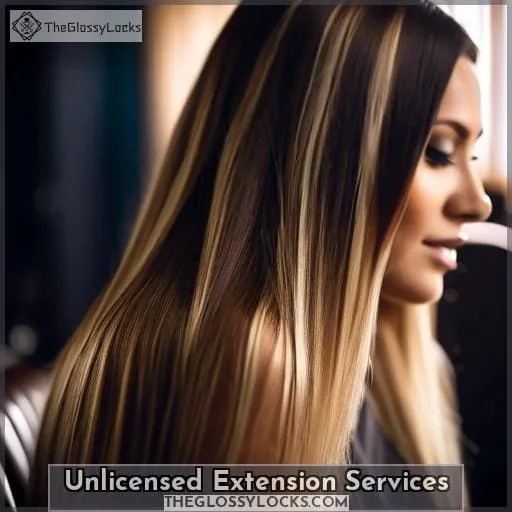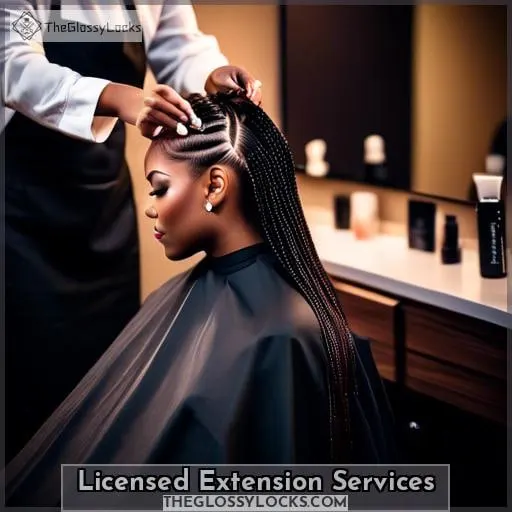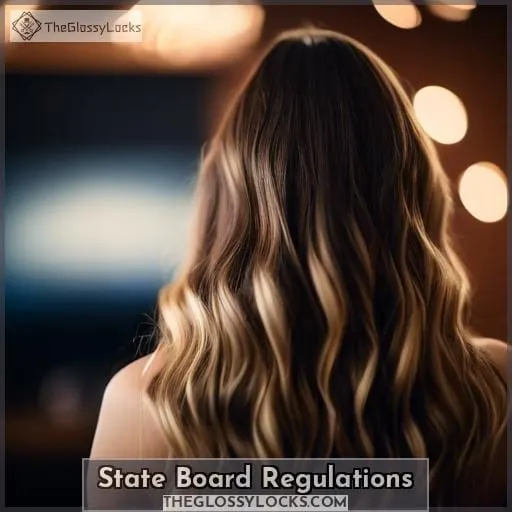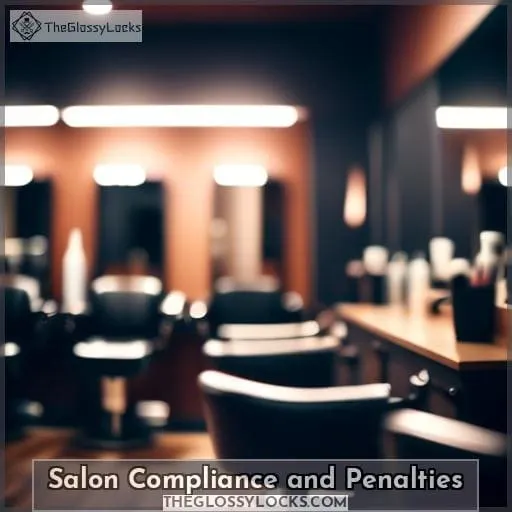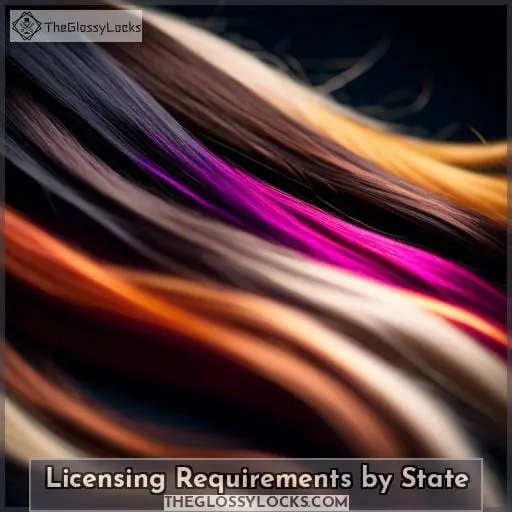This site is supported by our readers. We may earn a commission, at no cost to you, if you purchase through links.
 Navigating the world of hair extensions can be a complex journey, especially when it comes to understanding the legal requirements for applying them.
Navigating the world of hair extensions can be a complex journey, especially when it comes to understanding the legal requirements for applying them.
Whether you’re dreaming of enhancing your hair’s length and volume or considering a career in this lucrative field, it’s crucial to know if you can apply hair extensions without a license.
This article delves into the distinctions between licensed and unlicensed extension services, state board regulations, salon compliance, and the penalties for unlicensed practice.
We’ll also explore the licensing requirements by state and the benefits of attending cosmetology school.
If you’re seeking to empower yourself with the freedom to transform hair or to belong to the esteemed beauty industry, understanding these regulations is your first step.
No, you generally cannot apply hair extensions without a license, as most states require a cosmetology or similar license to perform any services that involve touching a client’s hair or scalp. However, selling hair extension products or providing advice on hair extension care may not require a license.
Table Of Contents
- Key Takeaways
- Unlicensed Extension Services
- Licensed Extension Services
- State Board Regulations
- Salon Compliance and Penalties
- Licensing Requirements by State
- Cosmetology School Benefits
- Frequently Asked Questions (FAQs)
- How can I ensure the hair extensions I use meet health and safety standards?
- What are the best practices for maintaining hygiene when applying hair extensions at home?
- Can I offer hair extension services at pop-up events or markets without a permanent salon location?
- How do I handle allergic reactions or damage to a client’s natural hair caused by extensions?
- What insurance options are available for independent stylists offering hair extension services?
- Conclusion
Key Takeaways
- Most states require a cosmetology license for hair extension services that involve strand-by-strand techniques, tape wefts, and chemical applications.
- Unlicensed hair extension services may include braiding, weaving, and micro rings without adhesives, but regulations vary by state.
- Employing unlicensed personnel for licensed hair extension services can result in fines and penalties for salons.
- Cosmetology licenses can enhance career prospects, access to exclusive products, and provide liability protection for independent stylists.
Unlicensed Extension Services
When considering whether you can apply hair extensions without a license, it’s crucial to understand that regulations vary by state.
Some states, like California, may not require a license for installing hair extensions, while others, such as Illinois, mandate obtaining a cosmetology license for such services.
It’s essential to check with your state’s licensing rules to ensure compliance and avoid potential fines or penalties for unlicensed work.
Braiding and Weaving
When it comes to hair extensions, the rules of the game are clear-cut. If you’re eyeing the art of braiding and weaving, here’s the lowdown:
- Braiding Classes: Dive into the world of braiding, where cultural traditions blend with modern styles. No need for a cosmetology license in some states.
- Weaving Techniques: Weaving your way through hair extensions? Some states might require you to hold a license, especially if adhesives are involved.
- Cultural Traditions: Embrace the rich history of hair braiding, a craft steeped in cultural significance and a testament to identity and heritage.
Micro Rings and Clip-ins
Continuing from the art of braiding and weaving, let’s dive into the world of micro rings and clip-ins. These nifty little inventions are a game-changer for those craving a mane makeover without the long-term commitment or the risk of hair damage.
Picture this: you’re gearing up for a big night out or simply want to switch up your look—micro rings and clip-ins are your go-to for a DIY salon experience right at home. But here’s the kicker, while they promise a world of versatility and freedom, not all hair extensions are created equal.
Quality matters, folks! Opting for high-grade products ensures your hair doesn’t just look good but stays healthy too.
And let’s not forget, with great power comes great responsibility. Proper installation and care are crucial to avoid those dreaded safety concerns. So, whether you’re a seasoned pro or a newbie to the hair extension game, remember, it’s not just about adding length or volume—it’s about doing it safely and smartly.
Sew-ins
When considering sew-in hair extensions, you’re looking at a method that can give you a natural and versatile look without the need for adhesives.
- Sew-in methods: There are full and partial sew-ins. Full sew-ins cover your entire head with braids and typically use a lace closure or frontal, while partial sew-ins leave some of your natural hair out to cover the wefts.
- Temporary vs. permanent: Sew-ins are a more permanent option compared to clip-ins or flip-ins, offering a longer-lasting solution without daily removal.
- Home application safety: While it’s possible to do a sew-in at home, it requires skill to avoid damaging your hair and scalp. It’s often best to seek professional help.
- Salon etiquette: When getting a sew-in at a salon, it’s important to communicate your expectations and take care of your natural hair beforehand.
- Post-application care: Proper maintenance, including regular washing and careful styling, will ensure your sew-in stays looking fresh and your natural hair remains healthy.
Licensed Extension Services
When considering the application of hair extensions, it’s important to understand the distinction between techniques that require a license and those that do not.
For instance, strand-by-strand methods using glue or keratin, tape wefts, and shrink links all involve adhesives or other materials that may necessitate a professional license to apply.
Additionally, any chemical applications associated with hair extensions also typically require the stylist to be licensed, as these processes can affect the hair’s structure and integrity.
Strand-by-Strand Techniques
When it comes to strand-by-strand hair extension methods, you’re stepping into the realm of precision and patience. Imagine each tiny extension as a puzzle piece, meticulously connected to your own hair with the stealth of a ninja using glue or keratin techniques.
It’s a game of hide and seek where the extensions blend so seamlessly, they’re virtually undetectable. But don’t be fooled, this isn’t a DIY adventure. You’ll need a cosmetology license to wield the tools of the trade, ensuring every strand is a silent partner to your natural locks.
Safety considerations are paramount, as the wrong move could spell disaster for your hair’s health. So, if you’re wondering, Can I do hair extensions without a license? The answer is a resounding no when adhesives are involved.
Tape Wefts and Shrink Links
Moving from the strand-by-strand techniques, let’s delve into tape wefts and shrink links. These methods are a notch above the rest when it comes to semi-permanent hair extensions.
- Tape Wefts: Ideal for fine hair, tape wefts lay flat against the scalp, minimizing tape weft damage and blending seamlessly with your natural locks.
- Shrink Links: These require a heat tool for application, offering a durable hold and full range of motion, but they can be tricky during shrink link removal.
- Tape Wefts vs. Shrink Links: Tape wefts are less invasive and great for quick changes, while shrink links offer a longer-lasting solution.
- Keratin vs. Tape Wefts: Keratin bonds offer longevity and durability, but the best tape wefts for fine hair provide a lightweight alternative without compromising volume.
Chemical Applications
When it comes to applying hair extensions with chemical processes, you’re entering a zone that requires a license. Why? Because you’re not just playing with strands; you’re dealing with keratin bonds and bonding techniques that can make or break someone’s crowning glory.
Think of keratin bonds as the super glue of hair extensions; they’re tough and meant to last. But here’s the kicker: if not applied with a wizard’s precision, you could be waving a wand of chemical damage over your client’s head.
Adhesive strength is no joke, and application methods aren’t a one-size-fits-all. It’s like trying to fit Cinderella’s slipper on every foot in the kingdom—disastrous. So, if you’re not keen on turning someone’s hair into a science experiment gone wrong, leave the chemical applications to the pros with licenses.
Remember, with great power comes great responsibility, and in the realm of hair extensions, that power is best wielded by those with the right credentials.
State Board Regulations
When considering whether you can apply hair extensions without a license, it’s crucial to understand the regulations set by your state’s Board of Barbering and Cosmetology.
If you’re using methods that don’t involve chemicals or adhesives, such as braiding or weaving, you may not need a license. However, for techniques that require adhesives, such as strand-by-strand applications with glue or keratin, a license is typically necessary.
It’s always best to contact the Board directly for the most accurate and up-to-date information regarding licensing requirements.
Extensions Without Chemicals
When it comes to hair extensions that don’t involve chemicals, you’re in luck—you can often apply them without needing a license.
You can braid, weave, and wrap to your heart’s content, much like a photography studio salon preps models without the need for shampooing or snipping. However, if you’re planning to use any adhesives or methods that cause tension on hair roots, like certain types of braiding or weaving, you’ll need to get licensed.
It’s a bit like body wrapping; you need the know-how to ensure you’re not just wrapping up trouble. So, before you dive into the world of hair extensions, make sure you’re clear on your state’s regulations to avoid any hairy situations.
Adhesive Use and Licensing
When diving into the world of hair extensions, especially those involving adhesives, it’s crucial to arm yourself with the right knowledge.
Adhesive requirements aren’t just a sticky situation; they’re your ticket to ensuring those luscious locks stay put without causing a hair-raising disaster. Bonding techniques have evolved, offering a seamless blend with your natural mane, but remember, with great power comes great responsibility.
Opting for certification options isn’t just about adding a feather to your cap; it’s about ensuring you’re not left tangled in a web of hair mishaps. Training programs are your best friend here, equipping you with the skills to navigate the hairy world of extensions like a pro.
And let’s not forget about liability insurance – it’s like the superhero cape that protects you when hair adventures go south.
Board of Barbering and Cosmetology Contact
If you’re considering applying hair extensions and wondering about the licensing requirements, it’s crucial to know when you need to be licensed and when you don’t.
-
Unlicensed Extension Services: You can braid, weave, and attach micro rings, clip-ins, and sew-ins without a license. These methods don’t involve chemicals or adhesives, so they’re generally considered safe for unlicensed individuals to perform.
-
Licensed Extension Services: Any method that involves adhesives, like strand-by-strand with glue or keratin, tape wefts, shrink links, and any chemical applications, requires a license. The use of adhesives and chemicals can potentially damage hair or skin if not used correctly, hence the need for professional training and licensing.
-
State Board Response: The Board of Barbering and Cosmetology has made it clear that extensions that don’t use chemicals don’t require a license. However, for extensions that involve adhesives, you must be licensed. If you need further clarification or have specific questions, you can reach out to the Board directly for their contact information and licensing requirements.
Salon Compliance and Penalties
If you’re considering offering hair extension services in a salon, it’s crucial to understand the regulatory environment.
State Boards regularly inspect salons to ensure all personnel are properly licensed, and the consequences of unlicensed practice can be severe.
You could face hefty fines or penalties, and salons risk similar sanctions for employing unlicensed workers.
Inspections for Licensed Personnel
In the world of beauty and cosmetology, the line between creativity and compliance can sometimes feel like walking a tightrope. Imagine you’re running a salon, a place where beauty dreams come to life. Now, picture this: the Board of Barbering and Cosmetology knocks on your door for a surprise inspection.
Here’s the scoop: salon inspections aren’t just about ticking boxes; they’re about ensuring safety and professionalism. If you’ve got unlicensed workers dabbling in adhesive use or any other service, you’re in for a roller coaster ride, but not the fun kind.
These unlicensed artists could turn your salon masterpiece into a Picasso of penalties.
Think of your salon as a ship. Every crew member needs to be shipshape—that means licensed employees only. The Board isn’t playing hide and seek; they’re on a mission to find unlicensed workers. And if they find them, it’s not just a slap on the wrist. We’re talking fines, citations, or even having to shutter your salon’s doors.
So, what’s the moral of the story? Keep your crew licensed, your practices clean, and your salon compliant. It’s not just about avoiding the storm of penalties; it’s about sailing smoothly in the sea of success.
Consequences for Unlicensed Practice
When you step into the world of hair extensions without the proper license, you’re playing with fire, and not just the kind that can singe your bangs.
Unlicensed practice can lead to hefty fines and penalties, not to mention the legal consequences that can ensnare you faster than a bad hair day.
Salons aren’t off the hook either; they risk fines and penalties for employing unlicensed workers, putting both their reputation and client safety on the line.
It’s a tangled web that no amount of detangler can fix. So, before you weave your next masterpiece, make sure your credentials aren’t hanging by a hair.
Licensing Requirements by State
When considering offering hair extension services, it’s crucial to understand the licensing requirements in your state.
These requirements vary widely, with some states allowing certain hair extension techniques without a license, while others mandate a cosmetology license for all types of extensions.
Before embarking on this career path, check your state’s specific regulations to ensure compliance and avoid potential penalties.
Cosmetology License Prerequisites
When eyeing a career in cosmetology, you’ll need to navigate a few key steps to ensure you’re playing by the rules.
- Eligibility Requirements: Check if you’re the right fit. Most states require you to be at least 17 and have a high school diploma or GED.
- Education Prerequisites: You’ll need to complete a state-approved cosmetology program. Hours required can vary wildly, from 1,000 to 2,100 hours.
- Background Check Requirements: A clean slate helps. Some states might ask for a criminal background check to ensure you’re up to snuff.
Additional Training Post-Cosmetology School
After you’ve conquered the world of cosmetology school, don’t hang up your shears just yet! Depending on where you plant your stylist’s chair, you might need to dive into additional training to stay sharp.
Think of it as leveling up in the game of locks and looks—each state has its own set of quests to complete.
Here’s a quick cheat sheet to keep you in the know:
| State | Additional Training Required? |
|---|---|
| CA | Yes, for certain techniques |
| TX | Sometimes, for advanced skills |
| NY | Yes, for specialty services |
| FL | Depends on the service |
Certification programs can be your golden ticket to the VIP section of the hair world, and they’re not just for show. They pack a punch with specialized skills that can help you snip your way to success.
And if the price tag makes you wince, remember that financial assistance might just be your knight in shining armor.
Continuing education isn’t just a hoop to jump through; it’s the secret sauce to keep your career sizzling. And let’s not forget about school accreditation and apprenticeship opportunities—they’re like the dynamic duo of your professional growth.
Cosmetology School Benefits
Attending cosmetology school offers you more than just the technical skills to apply hair extensions; it can significantly boost your career prospects.
By obtaining a cosmetology license, you’ll have access to exclusive hair products and the latest industry techniques, which can set you apart in the competitive beauty market.
Moreover, the credentials you gain can open doors to career advancement opportunities, allowing you to potentially command higher pay and build a loyal client base.
Career Advancement Opportunities
Attaining a cosmetology license can be your golden ticket to a world of career options and job growth.
- Higher Salary Potential: With a license, you’re not just a cut above the rest; you’re also likely to see more green for your skills. The more you learn, the more you earn!
- Skill Development: Like a master artist, you’ll refine your craft, learning the latest industry trends and techniques that keep clients coming back for more.
- Job Growth: The beauty realm is ever-expanding, and with a cosmetology license, you’re well-equipped to ride the wave of new opportunities that come your way.
- Career Options: Whether you dream of managing a salon or becoming a trendsetting stylist, a cosmetology license opens doors to various roles in the beauty sector.
Access to Exclusive Hair Products
As you’re considering the leap into the world of cosmetology, remember that your license is your golden ticket to a treasure trove of exclusive hair products. Imagine having the backstage pass to the latest and greatest in hair care, only available to those in the know.
It’s not just about the snip-snip here and the color splash there; it’s about unlocking a whole new realm of possibilities.
Here’s a quick glimpse into the kind of products you could be working with:
| Product Type | Exclusive Benefit | Why It’s a Game-Changer |
|---|---|---|
| Professional Hair Color | Richer pigments | Say goodbye to faded colors and hello to vibrant hues that last. |
| Salon-Grade Shampoos | Advanced formulas | These aren’t your average drugstore finds; they’re designed to keep hair looking salon-fresh. |
| Styling Tools | Precision and durability | These tools can take the heat and keep on styling, helping you craft the perfect look every time. |
| Treatment Serums | Intensive care | Target specific hair woes with potent serums that work like a charm. |
| Finishing Products | Superior hold and shine | Lock in styles with products that promise to keep every hair in place. |
By diving into cosmetology school, you’re not just meeting licensing requirements or ticking off certification benefits; you’re stepping into a world where state regulations are the map to uncharted territories of beauty.
And while unlicensed salons might seem like the easy route, they can’t offer you the keys to this exclusive kingdom. So, wield your shears with pride and let your creativity flow—there’s a whole world of hair magic waiting for you.
Frequently Asked Questions (FAQs)
How can I ensure the hair extensions I use meet health and safety standards?
To ensure your hair extensions meet health and safety standards, purchase from reputable suppliers who adhere to regulations.
Opt for products with clear ingredient listings to avoid harmful chemicals.
What are the best practices for maintaining hygiene when applying hair extensions at home?
Keep your hair game strong by treating those extensions like royalty!
Start by washing them correctly; think gentle and sulfate-free.
Always brush with care—no tugging or pulling.
And remember, never hit the hay with wet locks; that’s a tangled disaster waiting to happen.
Can I offer hair extension services at pop-up events or markets without a permanent salon location?
You can’t just wing it when offering hair extension services at pop-up events or markets.
While some states allow certain hair extension techniques without a license, the devil’s in the details.
Always check your state’s regulations to avoid a hairy situation.
How do I handle allergic reactions or damage to a client’s natural hair caused by extensions?
If you’re in a pickle because a client’s mane reacted badly to extensions, don’t just stand there like a deer in headlights.
First off, gently remove the extensions to stop the drama right at its tracks. Then, play it cool but act fast—advise them to see a doc for those pesky allergies or skin issues.
Keep your chin up, learn the ropes, and you’ll be weaving success stories in no time!
What insurance options are available for independent stylists offering hair extension services?
You’ve got options for safeguarding your hair extension hustle! Beauty and Bodywork Insurance offers policies starting at $96, covering a slew of mishaps.
Keep those weaves worry-free and your business booming!
Conclusion
Embarking on the journey to enhance beauty through hair extensions, you’ve navigated the complex terrain of legal requirements.
You can’t apply hair extensions without a license in most states, underscoring the importance of proper education and certification. By adhering to state regulations and pursuing cosmetology education, you’re not just following rules—you’re unlocking doors to a world of opportunities and ensuring the safety and satisfaction of your clients.

